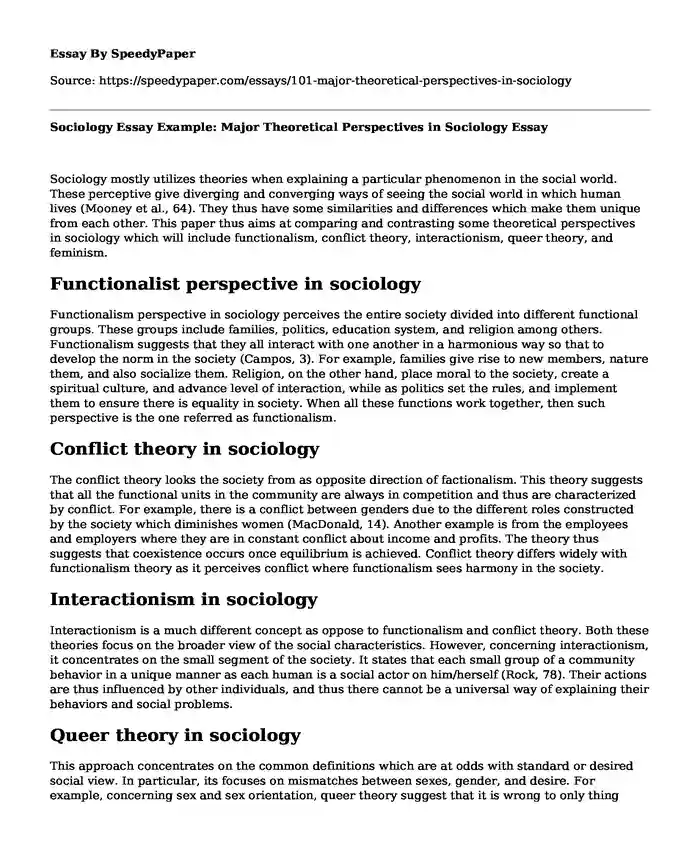
| Type of paper: | Essay |
| Categories: | Psychology Sociology Feminism |
| Pages: | 3 |
| Wordcount: | 730 words |
Sociology mostly utilizes theories when explaining a particular phenomenon in the social world. These perceptive give diverging and converging ways of seeing the social world in which human lives (Mooney et al., 64). They thus have some similarities and differences which make them unique from each other. This paper thus aims at comparing and contrasting some theoretical perspectives in sociology which will include functionalism, conflict theory, interactionism, queer theory, and feminism.
Functionalist perspective in sociology
Functionalism perspective in sociology perceives the entire society divided into different functional groups. These groups include families, politics, education system, and religion among others. Functionalism suggests that they all interact with one another in a harmonious way so that to develop the norm in the society (Campos, 3). For example, families give rise to new members, nature them, and also socialize them. Religion, on the other hand, place moral to the society, create a spiritual culture, and advance level of interaction, while as politics set the rules, and implement them to ensure there is equality in society. When all these functions work together, then such perspective is the one referred as functionalism.
Conflict theory in sociology
The conflict theory looks the society from as opposite direction of factionalism. This theory suggests that all the functional units in the community are always in competition and thus are characterized by conflict. For example, there is a conflict between genders due to the different roles constructed by the society which diminishes women (MacDonald, 14). Another example is from the employees and employers where they are in constant conflict about income and profits. The theory thus suggests that coexistence occurs once equilibrium is achieved. Conflict theory differs widely with functionalism theory as it perceives conflict where functionalism sees harmony in the society.
Interactionism in sociology
Interactionism is a much different concept as oppose to functionalism and conflict theory. Both these theories focus on the broader view of the social characteristics. However, concerning interactionism, it concentrates on the small segment of the society. It states that each small group of a community behavior in a unique manner as each human is a social actor on him/herself (Rock, 78). Their actions are thus influenced by other individuals, and thus there cannot be a universal way of explaining their behaviors and social problems.
Queer theory in sociology
This approach concentrates on the common definitions which are at odds with standard or desired social view. In particular, its focuses on mismatches between sexes, gender, and desire. For example, concerning sex and sex orientation, queer theory suggest that it is wrong to only thing about homosexual and heterosexual as the only views as such behavior brings about discrimination (Isaiah, 30). Concerning gender, the theory suggests that gender is based on human construction and thus has no any natural or legitimate foundation. This theory thus has a broader approach to all the social mismatches; it even includes some aspect of feminism.
Feminism in sociology
Feminism has become a strong social perceptive and especially from the 20th century. This social movement looks after the interest of women in the social. It advocates for equality between men and women in the political, economic, and social perspectives. Some of the main concentration of these social movement has been on equality in the education sector, employment, and policy area (Denis, 680). It should be heeded that there is a huge difference between queer theory and feminism. As said early, the queer theory is a much broader sociological aspect because, unlike the feminism which only focuses on women right, it also address the equality of other groups like gays and lesbians.
Conclusion
In conclusion, the above discussion has compared and contrasted some theoretical perspectives in sociology including functionalism, conflict theory, interactionism, queer theory, and feminism. It has been exhibited that most of these theories describe the social factors across the society but using different ways of focus.
Work Cited
Campos, Joseph J., et al. "A functionalist perspective on the nature of emotion." Japanese Journal of Research on Emotions 2.1 (2004): 1-20.
Denis, Ann. "Review essay: Intersectional analysis: A contribution of feminism to sociology." International Sociology 23.5 (2008): 677-694.
Isaiah Green, Adam. "Queer theory and sociology: Locating the subject and the self in sexuality studies." Sociological Theory 25.1 (2007): 26-45.
MacDonald, Kevin. "Evolution, psychology, and a conflict theory of culture." Evolutionary Psychology 7.2 (2009)
Mooney, Linda., et al. “Understanding social problems”. Nelson Education, 2014.
Rock, Paul. Making of symbolic interactionism. Springer, 2016.
Cite this page
Sociology Essay Example: Major Theoretical Perspectives in Sociology. (2018, Mar 21). Retrieved from https://speedypaper.com/essays/101-major-theoretical-perspectives-in-sociology
Request Removal
If you are the original author of this essay and no longer wish to have it published on the SpeedyPaper website, please click below to request its removal:
- Customer Relationship Management as Exemplified by Oracle Corporation. Free Essay.
- Business Essay Sample: Yelp Analysis
- Reflecting Essay Sample on Personal Development Planning
- Obesity Essay Example from Our Database
- Essay Sample: Fear and Anxiety in Learning a Foreign Language
- Lifestyle Modification for Overweight and Obese Patients. Essay Sample
- Sociology of My Name - Danielle. Essay Example
Popular categories




